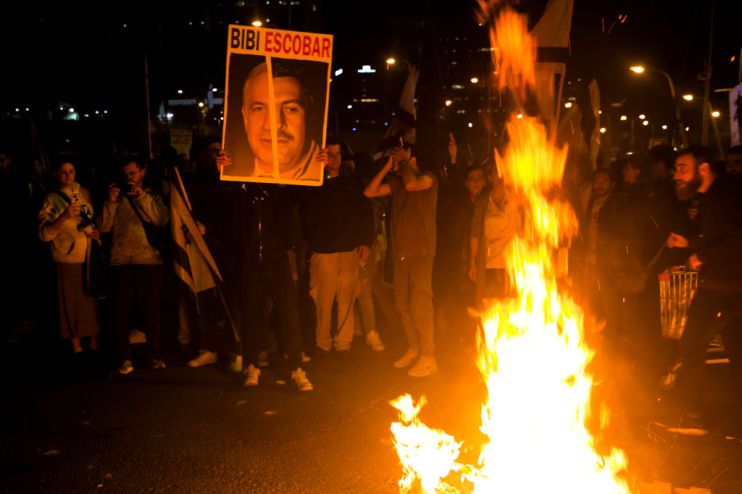UK urges Israel PM Netanyahu to seek ‘long term compromise’ on reform plans as thousands strike and protest

Israeli prime minister Benjamin Netanyahu on Monday announced a delay in his judicial overhaul plan, saying he wanted to give time to seek a compromise over the contentious package with his political opponents.
He made the announcement after two days of large protests against the plan.
“When there’s an opportunity to avoid civil war through dialogue, I, as prime minister, am taking a time-out for dialogue,” Mr Netanyahu said in a nationally televised address.
Striking a more conciliatory tone, he said he was determined to pass a judicial reform but called for “an attempt to achieve broad consensus”.
How has the UK reacted?
Britain welcomed Israeli prime minister Benjamin Netanyahu’s delay to his judicial overhaul that has sparked mass protests.
Foreign Secretary James Cleverly urged him to seek a “long-term compromise” with his critics over the widely-criticised plan.
Prime Minister Rishi Sunak stressed the importance of upholding “democratic values” to Mr Netanyahu as they met in Downing Street last week.
On Monday Mr Cleverly said: “The UK welcomes the decision today by prime minister Benjamin Netanyahu to pause legislation to reform Israel’s judiciary.
“The UK enjoys a deep and historic relationship with Israel. As the Prime Minister stressed in his meeting with PM Netanyahu last week, it is vital that the shared democratic values that underpin that relationship are upheld, and a robust system of checks and balances are preserved.
“We urge all parties to find common ground and seek a long-term compromise to this sensitive issue.”
Over the weekend, the Israeli leader told Piers Morgan on TalkTV: “There was a debate in my team whether it was 45 seconds or 47 out of the hour, so yes he did raise it, you’re quite right, I don’t deny it.
“But I think it’s become a perfunctory thing. You sort of have to say it because people are pressing.”
Much of the conversation between the two prime ministers focused on strengthening ties between the UK and Israel and shared security challenges such as Iran and Ukraine.
Critics say Mr Netanyahu’s coalition is dragging the country towards authoritarianism by trying to up end its system of checks and balances.
After a series of scandals involving wealthy associates, Mr Netanyahu is on trial for fraud, breach of trust and accepting bribes. He denies wrongdoing.
Press Association – Sam Blewett
Former Ambassador backs his man
Former Israeli ambassador to the UK Mark Regev has defended Benjamin Netanyahu’s judicial overhaul proposal, arguing that it was part of the government’s agenda when the prime minister was re-elected last year.
Speaking about the mass protests against the controversial reforms, Mr Regev told BBC Radio 4’s Today programme: “There were tens of thousands, maybe even hundreds of thousands of demonstrators on the street (in Israel), but there was a poll taken, and that was the Israeli election on November 1.
“This government was elected with a majority and judicial reform was part of its agenda.
“Even people who voted for the government support the idea that this be done in a less confrontational manner, that this be done through consensus.
“I think there’s support on both sides of the legal divide for this process of dialogue, which I hope will succeed, but I’m not sure it will.”
He added: “All coalition governments involve compromises, and I’m sure Netanyahu from his perspective, didn’t get re-elected prime minister to see other people dominate the agenda.”

What is going to happen next?
Immediately after his statement, the head of the country’s largest trade union said it would call off a general strike that threatened to grind Israel’s economy to a halt.
Mr Netanyahu spoke after tens of thousands of Israelis demonstrated outside parliament and workers launched a nationwide strike on Monday in a dramatic escalation of the mass protest movement aimed at halting his plan.
The chaos shut down much of the country and threatened to paralyse the economy.
Departing flights from the main international airport were grounded. Large shop chains and universities closed their doors, and Israel’s largest trade union called for its 800,000 members to stop work in health care, transit, banking and other fields.

Diplomats walked out at foreign missions, and local governments were expected to close pre-schools and cut other services. The main doctors union announced that its members would also strike.
The growing resistance to Mr Netanyahu’s plan came hours after tens of thousands of people burst into the streets around the country in a spontaneous show of anger at the prime minister’s decision to fire his defence minister after he called for a pause to the overhaul.
Chanting “the country is on fire”, they lit bonfires on Tel Aviv’s main road, closing it and many others throughout the country for hours.
Demonstrators gathered again Monday outside the Knesset, or parliament, turning the streets around the building and the supreme court into a roiling sea of blue and white Israeli flags dotted with rainbow Pride banners.
Demonstrations in Tel Aviv, Haifa and other cities drew thousands more.
“This is the last chance to stop this move into a dictatorship,” said Matityahu Sperber, 68, who joined a stream of people headed to the protest outside the Knesset. “I’m here for the fight to the end.”
Mr Netanyahu spent the day in consultations with his aides and coalition partners before announcing the delay.
Earlier, some members of his Likud party said they would support the prime minister if he heeded calls to halt the overhaul.
National security minister Itamar Ben-Gvir, who has been one of the strongest proponents of the plan, announced after meeting with the prime minister that he had agreed to a delay of at least a few weeks.
He said Mr Netanyahu had agreed to bring the legislation for a vote when parliament reconvenes for its summer session on April 30 “if no agreements are reached during the recess”.
Mr Netanyahu gave no timeline for a compromise to be reached in his speech, but expressed hope that the nation would heal and that people would enjoy the forthcoming Passover holiday.
The speech appeared to calm tensions, but it did not resolve the underlying tensions behind the protests.
Even before he spoke, the grassroots anti-government protest movement said a delay was would not be enough.
“A temporary freeze does not suffice, and the national protests will continue to intensify until the law is rejected in the Knesset,” organisers said.
The plan, driven by Mr Netanyahu, who is on trial for corruption, and his allies in Israel’s most right-wing government, has plunged Israel into one of its worst domestic crises.
It has sparked sustained protests that have galvanised nearly all sectors of society, including its military, where reservists have increasingly said publicly that they will not serve a country veering toward autocracy.
Israel’s Palestinian citizens, however, have largely sat out the protests.
The turmoil has magnified longstanding and intractable differences over Israel’s character that have riven it since the country was founded.
Protesters say they are fighting for the soul of the nation, saying the overhaul will remove Israel’s system of checks and balances and directly challenge its democratic ideals.
The government has called them anarchists out to topple democratically elected leaders.
Press Association – Associated Press
